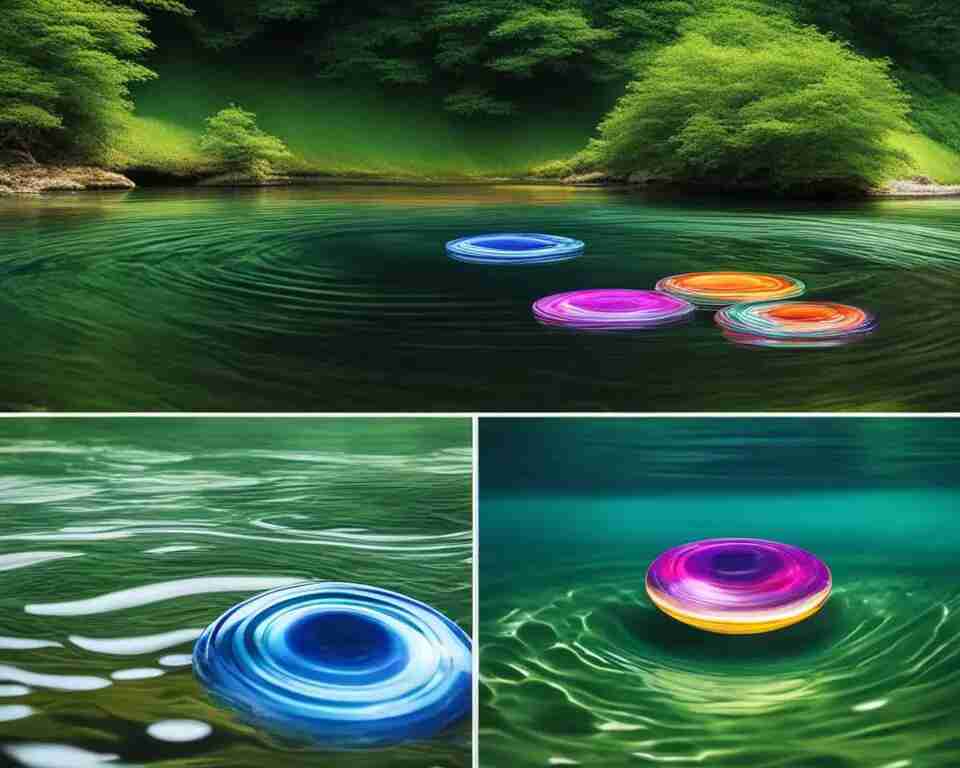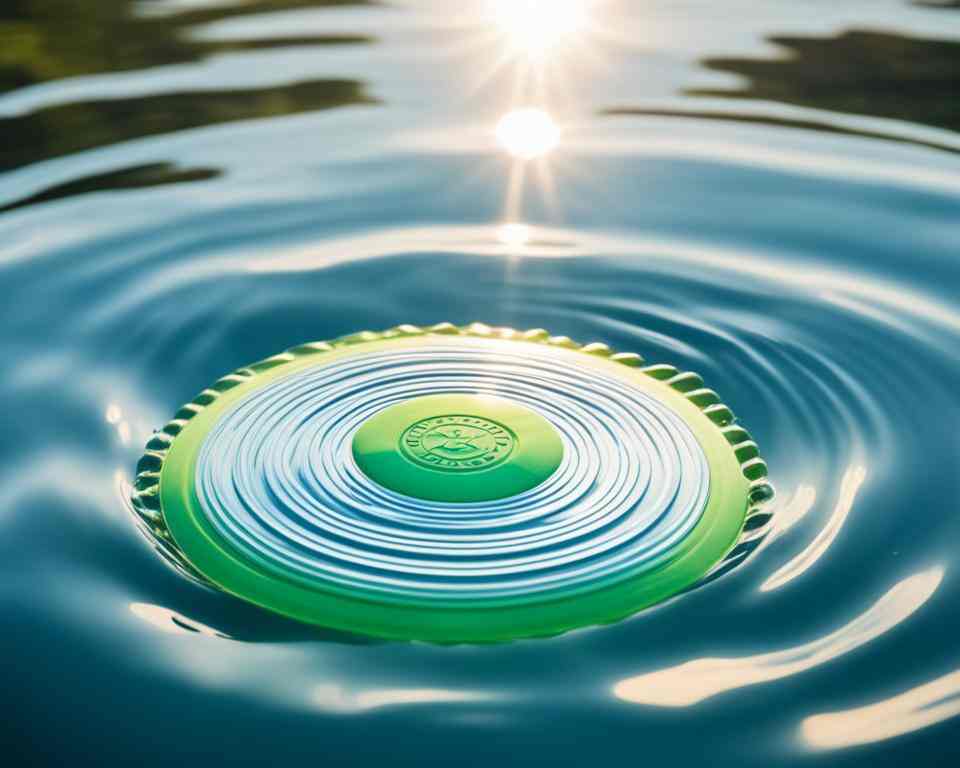As a disc golfer, you’ve probably encountered water hazards on the course. It’s a common challenge that can make or break your game. But have you ever wondered if disc golf discs have the ability to float? Can they defy gravity and stay afloat when they land in water? The answer may surprise you!
In this article, I’ll dive into the world of disc golf disc floatability. We’ll explore the science behind buoyancy and disc design, taking a closer look at the factors that determine whether a disc floats or sinks.
We’ll also examine real-world experiences of disc golfers who have faced water hazards and the common misconceptions surrounding disc floatation. By the end, you’ll have a clear understanding of whether disc golf discs have what it takes to stay on the surface or whether they’re doomed to sink.
Key Takeaways:
- Discover the science behind disc golf disc floatability.
- Explore the factors that affect whether a disc floats or sinks.
- Hear real-life experiences from disc golfers about disc floatation.
- Learn about common misconceptions surrounding floating discs.
- Find out which discs are top choices for water hazards.
Do Disc Golf Discs Float?
Yes, most disc golf discs are designed to float, especially those made of buoyant materials like DX and Pro plastics. This feature makes them suitable for water hazards on disc golf courses. However, it’s worth noting that some heavier discs may not float as effectively.

The Truth About the Floatability of Disc Golf Discs
To understand whether disc golf discs float, it’s important to grasp the science of buoyancy and how it relates to disc design. The shape and materials used in disc construction play a crucial role in determining whether a disc can stay afloat on water. Different factors, such as rim width, disc profile, and flight plate design, can affect the overall buoyancy of a disc.
Additionally, the materials used, such as plastic blends, can impact how a disc interacts with water. Furthermore, disc weight and density are key considerations in determining whether a disc will sink or float. We will explore these topics in detail to provide a comprehensive understanding of the floatability of disc golf discs.
The Science of Buoyancy and Disc Design
The science of buoyancy explains how objects float or sink in a fluid medium, such as water. Buoyancy is determined by the relationship between the weight of an object and the upward force exerted by the fluid it displaces.
In the case of disc golf discs, the design elements, including the rim width and profile, impact the amount of water that can be displaced and the resulting buoyant force. A well-designed disc with appropriate dimensions can increase the likelihood of floating on the water’s surface.
Materials and Design: Factors That Affect Disc Golf Disc Flotation
Some plastics are inherently more buoyant and resistant to water absorption. Additionally, specific disc designs, such as those with concave flight plates, can create air pockets that enhance buoyancy. Manufacturers experiment with various materials and designs to optimize the floatability of their discs.
Understanding the Role of Disc Weight and Density
Disc weight and density play a crucial role in determining whether a disc will sink or float in water. Generally, lighter discs will have a better chance of staying afloat due to their lower overall weight. However, density also factors into the equation.
For example, a disc made from a dense material may still sink even if it is relatively light. Understanding the relationship between disc weight and density is essential for disc golfers when deciding which discs to use in water hazard situations.
Do Disc Golf Discs Float in Real-World Conditions?
While understanding the science behind disc golf disc floatability is important, it’s equally crucial to examine how discs perform in real-world conditions. Testing disc golf discs in water provides valuable insights into their floatation capabilities and helps players make informed decisions about which discs to use in water hazards.
Let’s explore a practical approach to testing disc golf discs in water, drawing on both scientific methods and disc golfer experiences.
Testing Disc Golf Discs in Water: A Practical Approach
To determine whether a disc floats or sinks, a practical approach is to conduct controlled tests in various water conditions. This involves submerging the discs and observing their behavior. By using standardized methods and comparing the results, disc golfers can gauge the floatability of different discs and assess their suitability for water hazards.
One such testing method involves placing discs in a large container of water and measuring the amount of water displacement. Discs that displace a greater volume of water are more likely to float. Another method is to evaluate the buoyancy of discs based on their weight and design characteristics such as rim width and flight plate shape.
Disc Golfer Experiences with Water Hazards and Disc Floatation
Disc golfers who frequently encounter water hazards on the course have first-hand experiences with disc floatation. Their insights provide valuable information about the behavior of different discs in real-world conditions.
Some discs may have a reputation for staying afloat, while others may tend to sink. Disc golfer experiences can help shed light on specific disc models that perform well in water hazards and those that may need to be avoided.
Common Misconceptions Cleared: Discs That Float and Those That Don’t
There are common misconceptions about disc golf discs and their floatability. One such misconception is that all discs float. While some discs are designed to float, not all discs have the same capability. Certain factors, such as disc weight, density, and materials used in construction, can influence whether a disc will float or sink.
Furthermore, another misconception is that certain discs are guaranteed to sink in water. While some discs may be more prone to sinking due to their weight or design, it’s important to note that individual disc characteristics can vary, and there may be specific instances where even heavier discs have been observed to float.
| Myth | Reality |
|---|---|
| All discs float in water | Not all discs are designed to float, and some may sink |
| Heavy discs always sink | Disc characteristics can vary, and there are exceptions where heavier discs may float |
Top Floating Discs to Consider for Your Next Water Hazard
For disc golfers who frequently play courses with water hazards, having a floating disc can provide peace of mind and minimize the risk of disc loss. In this section, I will highlight some of the top floating discs available on the market.
When it comes to discs that float for disc golf, there are a few key brands and models that stand out for their superior floatability. These discs have been specifically designed to stay afloat on water while still offering excellent flight performance.

In the realm of fairway drivers, the Innova Leopard3 and the Discraft Buzzz SS are known for their impressive floatability. These discs maintain a stable flight path and are reliable choices for navigating water hazards. If you’re looking for a long-distance driver that can handle water hazards, the Dynamic Discs Trespass and the Latitude 64 Diamond are excellent options. These discs combine distance with the ability to stay afloat, offering a winning combination for disc golfers.
In addition to these popular choices, other notable floating disc golf discs include the MVP Wave and the Westside Discs Underworld. These discs are lauded for their stability and ability to glide across the water.
By considering these top floating discs, you can make an informed choice for your next water hazard encounter. These discs provide the confidence you need to tackle challenging shots while minimizing the risk of losing your disc to the watery depths.
Explore the wide range of floating discs available and find the one that best suits your playing style and preferences. With these reliable and buoyant options, you can focus on perfecting your disc golf game without the fear of losing your disc in the water.
Conclusion
In conclusion, adding a floating disc golf disc to your bag can be a smart move, especially when navigating water hazards on the course. Not only do floating discs provide confidence and reduce the risk of disc loss, but they also offer several other advantages.
Why a Floating Disc Golf Disc Might Be a Smart Addition to Your Bag
A floating disc golf disc can be a valuable asset when dealing with water hazards. By using a disc that floats, you can maintain your focus on the game without worrying about losing your disc in the water. This added convenience allows you to approach the game with greater confidence, knowing that your disc will stay afloat even if it lands in a water hazard.
The Environmental Benefits of Using Floating Disc Golf Discs
Using floating discs in disc golf not only benefits players but also has positive environmental impacts. Floating discs help prevent disc pollution in water bodies, reducing the accumulation of plastic waste. By choosing to play with floating discs, you contribute to the preservation of natural habitats and ecosystems, ensuring a cleaner and more sustainable environment for future generations.
Final Thoughts on Water-Resistant vs. Floating Disc Golf Options
When considering between water-resistant and floating disc golf options, it’s essential to carefully evaluate your preferences and playing conditions. While water-resistant discs may have their advantages, such as improved durability, floating discs offer the distinct advantage of staying afloat in water hazards.
Ultimately, the decision rests on your personal playing style and the extent of water hazards you encounter regularly. By understanding the benefits and implications of both options, you can make an informed decision that enhances your disc golf experience.


